June 2, 2023
The JICA Development Studies Program(JICA-DSP) promotes a wide range of initiatives to disseminate knowledge about Japan's modernization and development experiences—which differ from those of Europe and the U.S.—to JICA scholars who will go on to become future leaders, by supporting the futures of their countries.
Part of JICA-DSP has been implemented by JICA Tokyo, in partnership with Seiko Epson Corporation ("Epson")—a global company based in Nagano Prefecture—whose management strategy reflects contributions to the SDGs.
Epson is a manufacturer of products, such as printers and projectors, and is also involved in a wide range of activities focused on the fulfillment of the SDGs. They have agreed on a comprehensive partnership agreement with JICA and are moving forward with activities that contribute to solving social issues.
From Thursday, January 12, 2023, to Friday, January 13, 2023, JICA scholars visited Epson to learn how it developed into the global company it is today, and how its development is rooted in the community.
Twelve JICA scholars, who were enrolled in Japanese graduate schools, learned about the history of Epson's development through the history of the Suwa region, its mindset (the company's philosophy of taking on challenges in various new fields of business without the fear of failure. For instance, changing products and technologies such as watches, which it developed in the past, to create new value), and its community-based initiatives. By hosting a meeting to exchange opinions with the Japanese company's employees, the program provided JICA scholars an opportunity to interact with them and facilitated cooperation with the company.
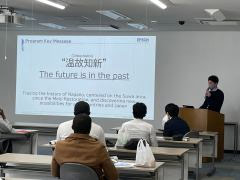
First, the JICA scholars attended a lecture on "Epson's development in light of Suwa's history and characteristics," which provided an easy-to-understand explanation of how the company was founded and developed during the period of modernization that followed World War Ⅱ in light of Suwa's geographical characteristics, and how it presented representative products at turning points such as the Tokyo Olympics.
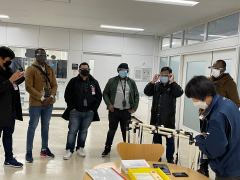
Getting hands-on experience with products
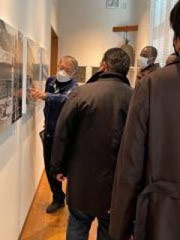
Explanation provided at Epson Memorial Hall
Next, the students were taken on a tour of the Epson Memorial Hall and History Museum. They were impressed to learn about the explanations of the unique technologies developed by the company, including the world's first quartz-movement wristwatch, the EP-101 compact digital printer that led to the company's pivot from watches to printers, and the Paper Lab, which can produce new paper from used paper, without relying on the conventional recycling process that demands large quantities of water.
They also understood the company's environmental considerations, which emphasize coexistence with the local natural environment, especially Lake Suwa.
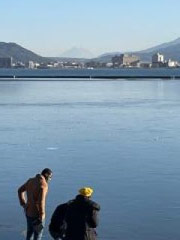
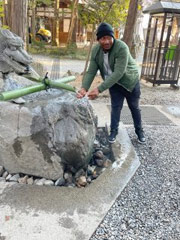
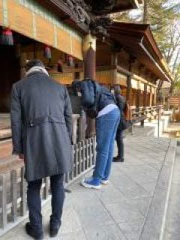
(1) Mt. Fuji as seen from Suwa Lake
(2) Washing hands with the water at Suwa Taisha(Shrine)
(3) Praying at Suwa Taisha Shrine
The weather on the day was ideal, allowing students to view Mt. Fuji clearly from the frozen surface on the shores of the Lake Suwa. This helped the students experience the topography of the Suwa area.
In the afternoon, the students visited the Suwa Taisha Shrine (Akimiya), which is a spiritual center for the people of the Suwa area. Onbashira, held once every seven years, is an event that brings the entire community together, and has led to the formation of a community in which residents cooperate with one another.
The area around Shimosuwa-shuku, where the Nakasendo and Koshu-Kaido roads meet, has long been a place for barter and exchange of information. Suwa, a remote inland city ill-suited for logistics, thus needed to handle small, high value-added products. Having heard this background explanation, JICA scholars were able to truly understand why the precision machinery industry, including watches and cameras, developed in this region.
At the dinner and networking event with Epson's employees, participants were split up into groups to discuss "methods of approaching Japanese people." The students heard the opinions of the Epson employees and exchanged information on a range of topics, including how to communicate effectively in the Japanese society and concerns about life in post-pandemic Japan, encouraging the students further.
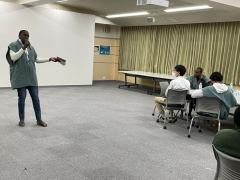
Attending a networking event in Yukata
At the Toyoshina Plant, which works with projectors, JICA scholars were introduced to a variety of products and hands-on demonstrations. They were impressed by the company's commitment to developing products that improve people's lives and by its ability to keep prices low through integrated in-house support, spanning parts manufacturing to sales.
In the subsequent workshop, each group engaged in lively discussions focused on the use of Epson's portable projectors to solve educational challenges that the students faced in their own countries. Epson employees remarked that they hoped the JICA scholars would consider how they would like their cities to be positioned on the world stage, and envision the development of these cities, while investigating approaches for urban development in their home countries.
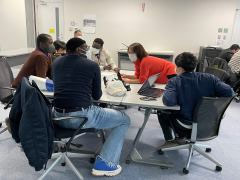
At the workshop
Director Takahashi Chiyuki, an expert on sericulture projects in India, explained the history of the Japanese sericulture industry in Japan and the Suwa area, including the industry's rise and fall, with a tour of the museum and a demonstration of silk reeling. This was an opportunity for the students to further their understanding of the evolution of industry in Suwa that underpinned Epson's development, as well as of the contributions of nimble-fingered female artisans in the development of the precision machinery industry.
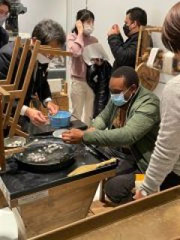
With Director Takahashi Chiyuki at the Okaya Silk Museum
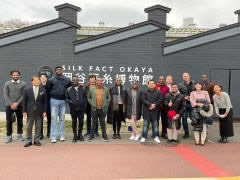
With Director Takahashi Chiyuki at the Okaya Silk Museum
At the end of the program, the participating international students commented that they finally understood the reasons for the growth of major Japanese industries through the course of Epson's development, and that they had learned to apply the theories they study at graduate school to practice. We hope that the learnings and insights gained on this trip will be put to good use in building the societies of tomorrow.
JICA Tokyo will continue to maintain and develop its partnership with Epson, and further enhance the program in the future.